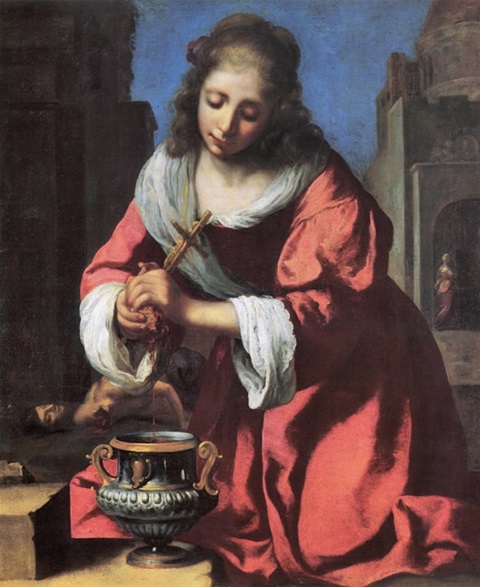July 21, 2020: ST. PRAXEDES
July 21, 2020: COMMEMORATION OF ST. PRAXEDES, VIRGIN
This is a wise Virgin, whom the Lord found watching.
This is she, who knew not the bed in sin: she shall have the fruit of her virtue in the reward of holy souls.
Prayer (Collect).
O God, who, amongst other miracles of thy power, hast bestowed the crown of martyrdom even on the weaker sex: mercifully grant, that we, who solemnize the feast of blessed Praxedes, thy Virgin and Martyr, may by following her example, come to thee. Through our Lord Jesus Christ, thy Son, who liveth and reigneth with thee, in the unity of the Holy Ghost, God, world without end. Amen.
On this day Pudentiana's angelic sister at length obtained from her Spouse release from bondage, and from the burden of exile that weighed so heavily on this last scion of a holy and illustrious stock. New races, unknown to her fathers when they laid the world at the feet of Rome, now governed the Eternal City. Nero and Domitian had been actuated by a tyrannical spirit; but the philosophical Cӕsars showed how absolutely they misconceived the destinies of the great city. The salvation of Rome lay in the hands of a different dynasty: a century back, Praxedes' grandfather, more legitimate inheritor of the traditions of the Capitol than all the Emperors present or to come, hailed in his guest, Simon Bar-Jona, the ruler of the future. Host of the Prince of the Apostles was a title handed down by Pudens to his posterity: for in the time of Pius I, as in that of St. Peter, his house was still the shelter of the Vicar of Christ. Left the sole heiress of such traditions, Praxedes, after the death of her beloved sister, converted her palaces into Churches, which resounded day and night with divine praises, and where pagans hastened in crowds to be baptized. The policy of Antoninus respected the dwelling of a descendant of the Cornelii; but his adopted son, Marcus Aurelius, would make no such exception. An assault was made upon the title of Praxedes, and many Christians were taken and put to the sword. The virgin, overpowered with grief at seeing all slain around her, and herself untouched, turned to God and besought him that she might die. Her body was laid with those of her relatives in the cemetery of her grandmother, Priscilla. The following is the short notice given by the Church:
Praxedes was a Roman virgin and sister of the virgin Pudentiana. When the Emperor Marcus Antoninus persecuted the Christians, she devoted both her time and her wealth to consoling them, and doing them every charitable service in her power. Some she concealed in her house: others she encouraged to firmness of faith. She buried the dead, and saw that those who were imprisoned wanted for nothing. But at length being unable to bear the grief caused by such a wholesale butchery of the Christians, she prayed God, that if it were expedient for her to die he would take her away from so much evil. Her prayer was heard, and on the 12th of the Calends of August, she was called to heaven, to receive the reward of her charity. Her body was buried by the priest Pastor in the tomb where lay her father and her sister Pudentiana, in the cemetery of Priscilla, on the Salarian Way.
Another account of St. Praxedes
She was daughter of Pudens, a Roman senator, and sister to St. Pudentiana, and in the days of Pope Pius I, and the Emperor Antoninus Pius, edified the church of Rome by the bright lustre of her virtues. All her great riches she employed in relieving the poor and the necessities of the church. By the comfort and succours which she afforded the martyrs, she endeavoured to make herself partaker of their crowns, and she lived in the assiduous exercise of prayer, watching, and fasting. She died in peace, and was buried near her sister on the Salarian road. Bede, and other martyrologists style her a virgin. An old title or parish church in Rome, bearing her name, is mentioned in the life of Pope Symmschus. It was repaired by Adrian I and Paschal I, and lastly by St. Charles Borromeo, who took from it his title of cardinal.
The primitive Christians lived only for heaven, and in every step looked up to God, regardless of all lower pursuits or meaner advantages that could interfere with their great design of knowing and loving him. This constant attention to God awed them in their retirements; this gave life and wings to their devotions, and animated them to fervour in all their actions; this carried them through the greatest difficulties and temptations, and supported them under all troubles and afflictions.
Taken from: The
Liturgical Year - Time after Pentecost, Vol. IV, Dublin, Edition 1901;
The Lives of the Fathers, Martyrs, and Other Principal Saints, Vol. VIII; and
The Divine Office for the use of the Laity, Volume II, 1806.
St. Praxedes, pray for us.
